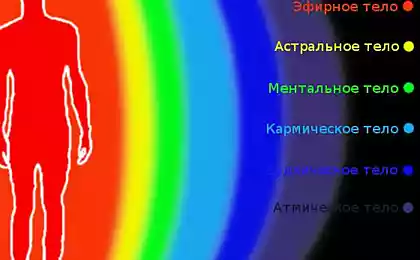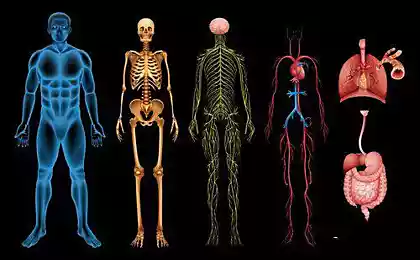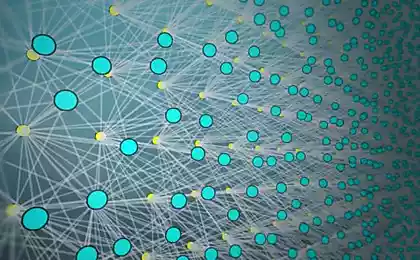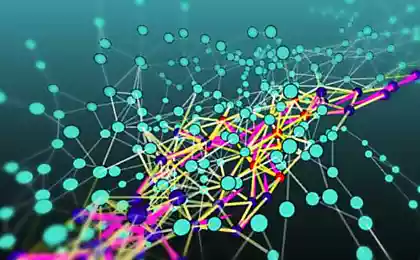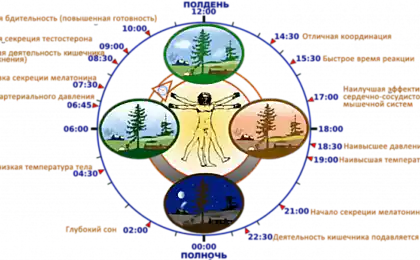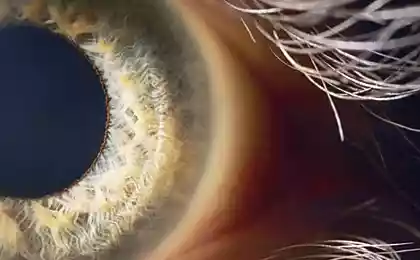1428
Crannies of the body and reflexes
The human body - a wonderful mechanism that is much more complex than any man-made device. While many of the functions that it performs to explain quite easily, some rather difficult to understand. For the most part people have no idea why their body is doing certain things, but scientists and researchers have studied them and found a simple explanation of complex daily functions of our body.
For the most part people have no idea why their body is doing certain things, but scientists and researchers have studied them and found a simple explanation of complex daily functions of our body.
10. Hiccups.
All hiccup. However, this action usually comes and goes pretty quickly, which means that it is only a minor inconvenience. Although for some it can become a more serious problem. Charles Osborne, for example, kcal for 68 years.
Scientists do not know the exact answer to the question why people hiccup, but offered a few theories. The author of one of the main is Daniel House. He suggested that developed hiccups in babies is an effective way to remove air from the stomach, in order to increase the volume of consumption of breast milk. Contraction of the diaphragm causes a suction that pulls air from the mouth, allowing the baby belch. House points to the fact that only mammals (the only animals who breastfeed) can hiccup and that bouts of hiccups are more common in the early years.
9. Appendix.
The appendix has long been considered a body that does more harm than good. Its function was a mystery, and many because he had problems. Appendicitis can cause severe pain, fever, and even death, if left untreated after rupture.
In 2007, after several years of research, scientists have finally determined what the nature of this body came up. Instead of being just a residual body, inherited from our evolutionary past, he was an important part of the immune system. According to the research group, the appendix provides a secure storage area for bacteria that our digestive system needed to perform their functions. When diseases such as dysentery, destroy bacteria in the digestive tract, the body helps them get back into the digestive system. He keeps back a portion of the bacteria necessary for the functioning of the immune system.
8. Itchy.
All of us tickled. Despite the fact that at times it can be nice, people do not like tickling and try to avoid it. But that does not stop them from trying to tickle others. The answer of our body to tickle thinkers put to a standstill for thousands of years.
Previously it was thought that our reaction may be, in essence, panicky response of the nervous system, similar to the reaction to a spider crawling on the body. But Kristin Harris, after numerous experiments suggested a more complex hypothesis. According to her hypothesis, tickling may be a system designed for the development of combat skills.
She points to the fact that close relatives or friends usually Shchekotov you a manner similar to the comic struggle. This causes the body to be grouped together and trying to break free as soon as possible, indicating the victim easiest way that avoids contact with the striker, without causing yourself harm. Meanwhile, the fact that people laugh and smile when they Shchekotov encourages forward and continue to do so with great enthusiasm. This increases the value of this exercise, because it is repeated several times with increasing intensity.
7. Wrinkling fingers and toes.
When you spend a lot of time in the water at your fingertips and toes are covered by the characteristic wrinkles. This function of our body baffled researchers for decades, and no one could explain the reason for this reaction. The main theory was that water causes the skin to swell, leading to wrinkling effect.
Now scientists think they have found the true cause. According to many studies rezultatm, shrinkage is an evolutionary advantage, which increases grip in wet conditions. Experiments have shown that wrinkled toes and hands have a better grip on wet objects.
Another study at Newcastle University, theorized that this feature of our body helped our ancestors to use the tools in the rain or a stable stand on damp surfaces, which gives them an advantage over other living beings who do not have a reaction to water.
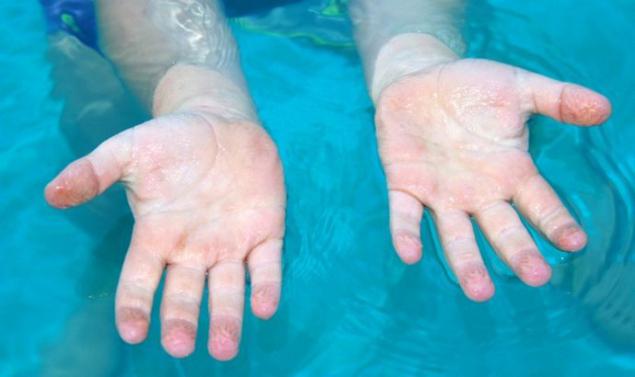
6. The lump in my throat.
When you are really sad, you could feel the lump in her throat, even though in fact there is nothing there. This is a pretty common occurrence that happens to people when they get bad news or are on the verge of an emotional breakdown.
The phenomenon of "lump in the throat" is the body's response to stressful or dangerous situation. In such situations, the emotional body pumps blood and oxygen to the brain and muscles, to increase the rate of reaction. This makes the heart beat faster, and breathing becomes more difficult. In turn, to eliminate this effect, the vocal cords extend, allowing more air to pass through the throat. However, when a person tries to swallow the glottis to be closed, and there is the effect of "lump in the throat."

5. The phantom vibration syndrome.
If you use a smartphone or other electronic device, which has a vibration function, you probably experienced "phantom vibration syndrome." Do you feel the vibration in your pocket, pull out the phone and see what the phone screen dark. There is no incoming messages or missed calls, but you still feel it clearly.
In 2010, research showed that 68 percent of people using such devices, have a sense of phantom vibration. One possible explanation is that the brain distorts sensory information, such as a small movement of clothing, and interprets it as a vibration, as it waits for the device.

4. shivers down my spine.
Shivers down my spine and goosebumps, which traditionally accompanies it, appear in different situations. This usually occurs in a tense moment when the person in danger. Fear affects the hypothalamus, a part of the brain that controls certain functions of the nervous system and it splashes out a large amount of adrenaline to help the body to react to an emergency situation. This causes the muscles to contract, and the hair stand on end, which leads to the appearance of goose skin. The same reaction occurs when a person is experiencing strong feelings, such as love, happiness or shock. Music can also cause tremors and tingling in the skin, because it evokes strong feelings among people, causing the brain adrenaline splashes.

3. Yawning.
The act of yawning so contagious that even the reading of the item can cause a person to yawn. On this occasion it was a lot of debate. One theory is that yawning allows the body to capture a larger amount of oxygen during critical events leading to muscle tone. Other theories suggest that this may be a way to tell the boredom and fatigue.
In 2014, researchers have come up with a new theory, which brings together many elements contrary to yawn, to give a full explanation of the function of our body. According to this study, yawning - it is the way in which our body tries to cool our brains. Yawn supplies fresh air our body and increases blood flow in the brain, knocking over-heat. This theory also explains why yawning appears in certain situations disconnected. The brain activates in stressful situations, and before any important action. Also, the temperature is increased, when a person gets tired. Yawns help fight fatigue, causing the brain to a tone.

2. The alcohol-induced blackouts.
Do not remember himself - quite common for those who drank large amounts of alcohol. While these blackouts can occur due to other drugs, most often they are connected with alcohol.
Studies have shown that alcohol deprive the brain's ability to transfer events from short-term memory into long-term, essentially preventing people to remember recent events. This is caused by the fact that stops the production of alcohol glutamate receptors in the hippocampus. This deprives the ability of neurons to communicate with each other, blocking the transmission of memory. And the person is deprived of the ability to create new memories. But the man can recall last night, partially or completely, as in the memory of our brain, the information may still remain. To people remembered just need a little hint, and then the transfer of stale information in long-term memory resumes.

1. Motion sickness.
Seasickness and other types of sickness is suffering a lot of people, when they travel in vehicles such as ships, planes and cars. The main symptoms - nausea and dizziness.
This is all happening because of the discrepancy between what one feels and sees. On a rocking boat, for example, the body feels movement through the inner ear, but does not see the movement as the boat seems to be fixed. It makes the brain receives conflicting information. It is a psychological defense mechanism, because, according to the brain, the most likely cause of the conflict between the senses is a poison. Nausea and vomiting are the way the body gets rid of toxins, which he thinks are attacking it.
While medications can prevent motion sickness, it may be facilitated by looking at the horizon on a boat or in a box in the car. This gives the opportunity to experience the visual eye movement, and so the brain does not receive conflicting information.

Source: listverse.com
For the most part people have no idea why their body is doing certain things, but scientists and researchers have studied them and found a simple explanation of complex daily functions of our body.
10. Hiccups.
All hiccup. However, this action usually comes and goes pretty quickly, which means that it is only a minor inconvenience. Although for some it can become a more serious problem. Charles Osborne, for example, kcal for 68 years.
Scientists do not know the exact answer to the question why people hiccup, but offered a few theories. The author of one of the main is Daniel House. He suggested that developed hiccups in babies is an effective way to remove air from the stomach, in order to increase the volume of consumption of breast milk. Contraction of the diaphragm causes a suction that pulls air from the mouth, allowing the baby belch. House points to the fact that only mammals (the only animals who breastfeed) can hiccup and that bouts of hiccups are more common in the early years.
9. Appendix.
The appendix has long been considered a body that does more harm than good. Its function was a mystery, and many because he had problems. Appendicitis can cause severe pain, fever, and even death, if left untreated after rupture.
In 2007, after several years of research, scientists have finally determined what the nature of this body came up. Instead of being just a residual body, inherited from our evolutionary past, he was an important part of the immune system. According to the research group, the appendix provides a secure storage area for bacteria that our digestive system needed to perform their functions. When diseases such as dysentery, destroy bacteria in the digestive tract, the body helps them get back into the digestive system. He keeps back a portion of the bacteria necessary for the functioning of the immune system.
8. Itchy.
All of us tickled. Despite the fact that at times it can be nice, people do not like tickling and try to avoid it. But that does not stop them from trying to tickle others. The answer of our body to tickle thinkers put to a standstill for thousands of years.
Previously it was thought that our reaction may be, in essence, panicky response of the nervous system, similar to the reaction to a spider crawling on the body. But Kristin Harris, after numerous experiments suggested a more complex hypothesis. According to her hypothesis, tickling may be a system designed for the development of combat skills.
She points to the fact that close relatives or friends usually Shchekotov you a manner similar to the comic struggle. This causes the body to be grouped together and trying to break free as soon as possible, indicating the victim easiest way that avoids contact with the striker, without causing yourself harm. Meanwhile, the fact that people laugh and smile when they Shchekotov encourages forward and continue to do so with great enthusiasm. This increases the value of this exercise, because it is repeated several times with increasing intensity.
7. Wrinkling fingers and toes.
When you spend a lot of time in the water at your fingertips and toes are covered by the characteristic wrinkles. This function of our body baffled researchers for decades, and no one could explain the reason for this reaction. The main theory was that water causes the skin to swell, leading to wrinkling effect.
Now scientists think they have found the true cause. According to many studies rezultatm, shrinkage is an evolutionary advantage, which increases grip in wet conditions. Experiments have shown that wrinkled toes and hands have a better grip on wet objects.
Another study at Newcastle University, theorized that this feature of our body helped our ancestors to use the tools in the rain or a stable stand on damp surfaces, which gives them an advantage over other living beings who do not have a reaction to water.

6. The lump in my throat.
When you are really sad, you could feel the lump in her throat, even though in fact there is nothing there. This is a pretty common occurrence that happens to people when they get bad news or are on the verge of an emotional breakdown.
The phenomenon of "lump in the throat" is the body's response to stressful or dangerous situation. In such situations, the emotional body pumps blood and oxygen to the brain and muscles, to increase the rate of reaction. This makes the heart beat faster, and breathing becomes more difficult. In turn, to eliminate this effect, the vocal cords extend, allowing more air to pass through the throat. However, when a person tries to swallow the glottis to be closed, and there is the effect of "lump in the throat."

5. The phantom vibration syndrome.
If you use a smartphone or other electronic device, which has a vibration function, you probably experienced "phantom vibration syndrome." Do you feel the vibration in your pocket, pull out the phone and see what the phone screen dark. There is no incoming messages or missed calls, but you still feel it clearly.
In 2010, research showed that 68 percent of people using such devices, have a sense of phantom vibration. One possible explanation is that the brain distorts sensory information, such as a small movement of clothing, and interprets it as a vibration, as it waits for the device.

4. shivers down my spine.
Shivers down my spine and goosebumps, which traditionally accompanies it, appear in different situations. This usually occurs in a tense moment when the person in danger. Fear affects the hypothalamus, a part of the brain that controls certain functions of the nervous system and it splashes out a large amount of adrenaline to help the body to react to an emergency situation. This causes the muscles to contract, and the hair stand on end, which leads to the appearance of goose skin. The same reaction occurs when a person is experiencing strong feelings, such as love, happiness or shock. Music can also cause tremors and tingling in the skin, because it evokes strong feelings among people, causing the brain adrenaline splashes.

3. Yawning.
The act of yawning so contagious that even the reading of the item can cause a person to yawn. On this occasion it was a lot of debate. One theory is that yawning allows the body to capture a larger amount of oxygen during critical events leading to muscle tone. Other theories suggest that this may be a way to tell the boredom and fatigue.
In 2014, researchers have come up with a new theory, which brings together many elements contrary to yawn, to give a full explanation of the function of our body. According to this study, yawning - it is the way in which our body tries to cool our brains. Yawn supplies fresh air our body and increases blood flow in the brain, knocking over-heat. This theory also explains why yawning appears in certain situations disconnected. The brain activates in stressful situations, and before any important action. Also, the temperature is increased, when a person gets tired. Yawns help fight fatigue, causing the brain to a tone.

2. The alcohol-induced blackouts.
Do not remember himself - quite common for those who drank large amounts of alcohol. While these blackouts can occur due to other drugs, most often they are connected with alcohol.
Studies have shown that alcohol deprive the brain's ability to transfer events from short-term memory into long-term, essentially preventing people to remember recent events. This is caused by the fact that stops the production of alcohol glutamate receptors in the hippocampus. This deprives the ability of neurons to communicate with each other, blocking the transmission of memory. And the person is deprived of the ability to create new memories. But the man can recall last night, partially or completely, as in the memory of our brain, the information may still remain. To people remembered just need a little hint, and then the transfer of stale information in long-term memory resumes.

1. Motion sickness.
Seasickness and other types of sickness is suffering a lot of people, when they travel in vehicles such as ships, planes and cars. The main symptoms - nausea and dizziness.
This is all happening because of the discrepancy between what one feels and sees. On a rocking boat, for example, the body feels movement through the inner ear, but does not see the movement as the boat seems to be fixed. It makes the brain receives conflicting information. It is a psychological defense mechanism, because, according to the brain, the most likely cause of the conflict between the senses is a poison. Nausea and vomiting are the way the body gets rid of toxins, which he thinks are attacking it.
While medications can prevent motion sickness, it may be facilitated by looking at the horizon on a boat or in a box in the car. This gives the opportunity to experience the visual eye movement, and so the brain does not receive conflicting information.

Source: listverse.com
